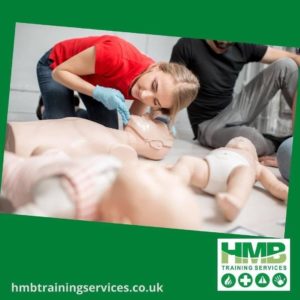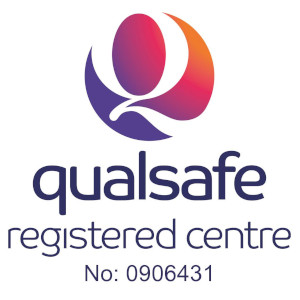Are you looking for Paediatric First Aid Courses ‘near me’? At HMB Training Services we can help you with your paediatric first aid training for your staff at your childcare setting. What’s more our paediatric courses are in line with the Ofsted guidelines.
Statistics – what you need to know
Children’s accidents are a major public health concern, accounting for a considerable number of preventable deaths, serious injuries, and long-term impairment in the United Kingdom.
Under-5s are particularly at risk of being injured in home accidents, with falls accounting for the majority of non-fatal accidents and threats to breathing such as suffocation, strangulation and choking causing the highest number of deaths.
Most home accidents are preventable through increased awareness, improvements in the home environment and greater product safety.
Within the home, the biggest number of accidents happen in the living or dining room. However, the most serious accidents happen in the kitchen and on the stairs. Every year more than 67,000 children experience an accident in the kitchen – 43,000 of these are aged between 0-4 years; 58,000 children have accidents on the stairs.
Within childcare settings accidents are considerably low compared to the home, with health and safety in place and adult supervision mixed with less hazards.
The Importance of Paediatric First Aiders in a Childcare Setting
Paediatric first aid training came into the EYFS Framework in September 2016 through Millie’s Law. “Millie’s Law” refers to a campaign and initiative in the United Kingdom aimed at improving first aid training for individuals who work with young children. The campaign was inspired by the tragic death of Millie Thompson, a nine-month-old girl who choked on her food at a nursery in 2012.
Millie’s Law advocates for mandatory paediatric first aid training for all nursery staff and professionals working with young children. The goal is to ensure that individuals responsible for the care of children are equipped with the knowledge and skills to respond effectively to medical emergencies, such as choking or cardiac arrest. The hope is that by enhancing the first aid training of childcare providers, they can act promptly and appropriately in critical situations, potentially saving lives.
In the aftermath of Millie’s death, her parents and supporters lobbied for changes in the law to make first aid training a requirement for all staff members working with children under the age of 6 years. This includes Nurseries and Schools. The campaign gained momentum, leading to the introduction of Millie’s Law in the UK. The specific regulations and requirements may vary, so it’s advisable to check the latest updates and legislation in your region for the most accurate information.
How Many Paediatric First Aiders Do I need?
First aid and paediatric first aid share the fundamental goal of providing immediate care and assistance to individuals in the event of injury or sudden illness. However, there are specific differences between the two, primarily related to the focus and techniques tailored for different age groups.
- Target Population:
- First Aid: Generally addresses first aid techniques applicable to individuals of all age groups, including adults.
- Paediatric First Aid: Specifically focuses on the care of infants and children. It addresses the unique needs, vulnerabilities, and developmental considerations associated with paediatric patients.
- Content and Techniques:
- First Aid: Covers a broad range of first aid techniques applicable to various injuries, illnesses, and emergencies that may occur in individuals of all ages.
- Paediatric First Aid: Includes specialised content relevant to the unique medical and behavioural aspects of infants and children. This may involve specific techniques for dealing with paediatric emergencies, such as choking or administering CPR to infants and young children.
- Training Emphasis:
- First Aid: Emphasises a general understanding of emergency response techniques applicable to the entire population.
- Paediatric First Aid: Focuses on the specific needs and challenges associated with caring for paediatric patients, including recognising signs of distress in children and providing age-appropriate care.
- Certification Requirements:
- First Aid: Certification programmes are often designed to cover a broad spectrum of emergency situations for individuals of all ages.
- Paediatric First Aid: Certification is tailored to address the unique considerations involved in providing first aid to infants and children.
In summary, while both first aid and paediatric first aid share common principles, paediatric first aid is specialised to address the distinct characteristics and medical needs of infants and children. Individuals working in settings with children, such as childcare providers or educators, may benefit from specific training in paediatric first aid to ensure they can respond effectively to emergencies involving young individuals. Read at the end of the paediatric first aid courses near me.
What happens on a Paediatric first aid course?
On a full paediatric first aid course they are designed to equip individuals with the knowledge and skills needed to provide immediate and appropriate first aid to infants and children. These courses are typically targeted towards those who work in childcare settings, such as nurseries, pre-schools, and schools. The content of a full paediatric first aid course covers the following key topics:
- Role of a First Aider:
- Understanding the responsibilities and duties of a paediatric first aider.
- Legal considerations and obligations.
- First Aid Kits, administrating medication and accident reporting
- Assessment of the Situation:
- Recognising and assessing the nature of paediatric emergencies.
- Identifying potential risks and ensuring personal safety.
- CPR (Cardiopulmonary Resuscitation):
- Performing CPR on infants and children.
- Understanding the differences in CPR techniques for different age groups.
- Unconsciousness:
- Causes of unconsciousness
- How to put a casualty into the recovery position
- Choking:
- Recognising and responding to choking incidents in infants and children.
- Techniques for clearing airways.
- Bleeding and Shock:
- Managing bleeding and applying appropriate first aid measures.
- Recognising and responding to shock in paediatric patients.
- Anaphylaxis:
- Understanding allergic reactions in children.
- Administering an adrenaline auto-injector.
- Seizures:
- Recognising different types of seizures in children.
- Providing first aid during a seizure.
- Common Childhood Illnesses and Injuries:
- Recognising and responding to conditions such as asthma, meningitis, and febrile convulsions.
- Dealing with injuries such as fractures, burns, and scalds.
- Broken Bones & Spinal Injuries
- Recognising the signs & symptoms of broken bones
- Demonstrating how to apply a sling bandage
- Understanding how spinal injuries can occur
- How to manage a spinal injury
- Recognising a head injury
- Other conditions
- Asthma – Signs and Symptoms and treatment
- Diabetes – Signs and Symptoms and treatment
- Hypo/Hyperthermia – Signs and Symptoms and treatment
- Poisons – Signs and Symptoms and treatment
The Importance of attending a Paediatric First Aid Courses Near Me
Further Paediatric First Aid Courses Near Me
Apprentices or staff who are unlikely to be left alone with children, and lunchtime supervisors are all candidates for our Emergency Paediatric First Aid Training. Our one-day course includes roles and responsibilities of a first aider, first aid kits, accident reporting, reasons of a life-threatening condition, CPR, defibrillator, causes of unconsciousness and recovery position, choking, bleeding, burns, and minor injuries.
Our Paediatric First Aid Training 2-day course includes all elements of the one-day first course including; broken bones, spinal injuries, head injuries, slings, sprains and strains, diabetes, febrile convulsions, hypothermia, hyperthermia, epilepsy, poisons, eye injuries, allergies and anaphylaxis, and asthma.
This course is ideal for those working alone with children, whether you are a Teacher or Teaching Assistant working in the Early Years or a childminder. Our Paediatric courses are fully accredited. We have open courses for Paediatric First Aid Courses Near Me running at our Brownhills Centre or we can come to your setting.
Additionally, if you prefer to have a short session with us and complete a bespoke parents/grandparents course; our Parent’s first aid course is for you. These start from 2 hours up to 4 hours. Can include any modules of your choice, but we will cover: reasons of life-threatening conditions, CPR, Defibrillator, unconsciousness, recovery, choking and gagging, burns, and minor illnesses, including dangers within the home.
Our paediatric first aid courses near me provide you with the peace of mind that you’ll know what to do in the event of an emergency, such as illnesses like asthma. Furthermore, getting first aid training will give you the skill set of knowing exactly what to do if your child, friend, or work colleague suffers from an injury or life threatening condition. Never put yourself in a situation where you’re thinking, “What if I knew what to do?” Get First Aid Trained Today!
Call us on 01543 453338 or email us on info@hmbtrainingservices.co.uk




